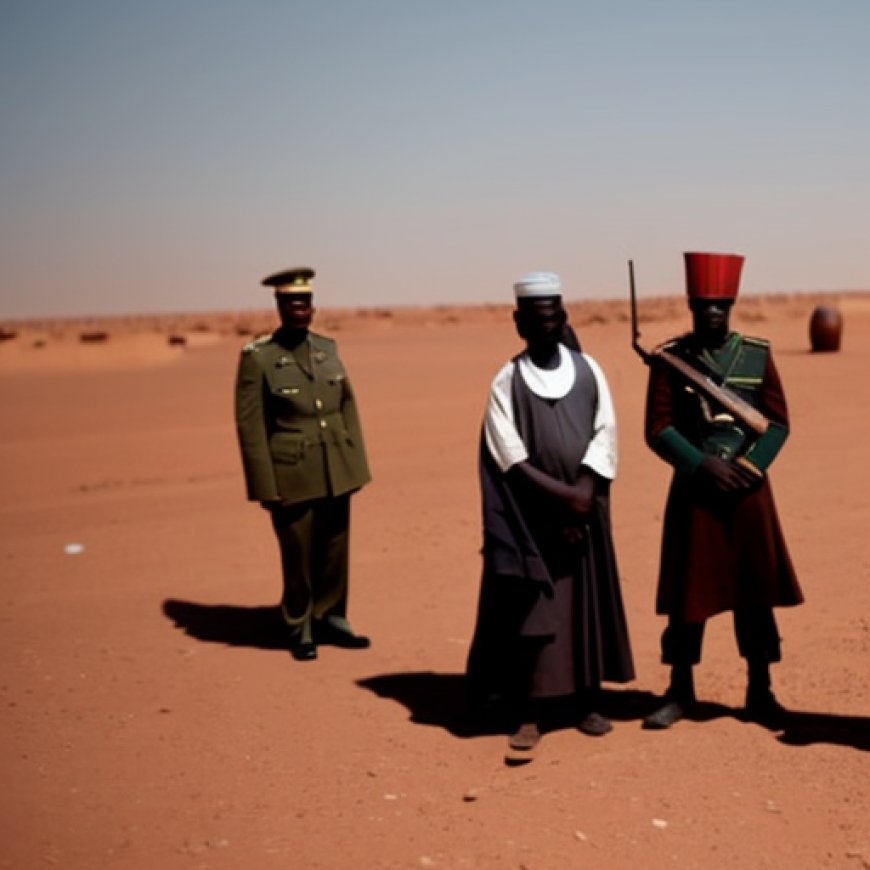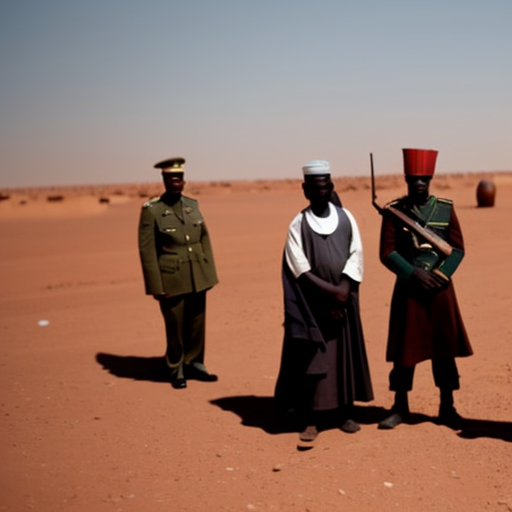‘No good options’: Sudan’s warring sides have committed ‘extensive war crimes,’ Amnesty says
'No good options': Sudan's warring sides have committed 'extensive war crimes,' Amnesty says ABC News


Sudan’s Warring Parties Commit Extensive War Crimes, Says Amnesty International

Introduction
A leading human rights group, Amnesty International, has reported that Sudan’s warring parties have committed extensive war crimes, including mass killings of civilians, rape, and sexual slavery of women, in the ongoing conflict.
The Conflict in Sudan
The east African country descended into chaos in mid-April when tensions between the military and the paramilitary Rapid Support Forces (RSF) erupted into open fighting in the capital of Khartoum and other parts of the country.
War Crimes and Sexual Violence
Amnesty International’s 56-page report highlights deliberate targeting and killing of civilians, as well as widespread sexual violence against women. Women were raped and held in conditions amounting to sexual slavery, particularly in Khartoum and the western region of Darfur.
Donatella Rovera, co-author of the report, emphasized that sexual violence has been a defining element of this conflict since its inception. Civilians are trapped with limited options, as leaving is difficult and staying is incredibly dangerous.
The majority of rape cases were attributed to the RSF and its allied Arab militias. The report reveals that the RSF abducted 24 women and girls, some as young as 12, and subjected them to rape by multiple RSF members.
Rovera stated that war crimes such as sexual assault are occurring on a large scale.
Involvement of Military and RSF
While the RSF, which originated from the notorious Janjaweed militias, is primarily responsible for deliberate attacks and rape cases, some members of the military have also been accused of these crimes, according to Amnesty International.
In response to the report, the military claimed to have established a unit to minimize civilian harm, while the RSF denied allegations of sexual violence and violent acts in West Darfur.
Impact on Civilians and Ethnic Clashes
The conflict has transformed Khartoum and other urban areas into battlefields. Darfur, which witnessed genocidal war in the early 2000s, has experienced some of the worst violence, with the current fighting escalating into ethnic clashes.
As a result, approximately 4 million people have been displaced, either seeking refuge within Sudan or fleeing to neighboring countries, according to the U.N. migration agency.
The RSF and its allied Arab militias have been primarily blamed for the violence in Darfur, particularly targeting the African Masalit community. However, Amnesty International also reported instances where armed men from the Masalit targeted Arabs suspected of supporting the militias.
The report documents waves of violence in West Darfur province, including the killing of civilians and the destruction of homes, hospitals, and markets.
Call for Action
Agnès Callamard, the secretary general of Amnesty International, stated that civilians throughout Sudan are enduring unimaginable horror every day. The group called on the warring parties and their affiliated groups to cease targeting civilians and ensure safe passage for those seeking safety.
Individual Tragedies and Attacks on Places of Worship
The report highlights individual tragedies, such as the killing of three children from the same family in Khartoum’s Kalakla neighborhood. The group was unable to determine which side was responsible for the killings.
Amnesty International also documented an attack by the RSF on the Mar Girgis Coptic church in Khartoum’s Bahri district. RSF members stormed the church, shooting five members of the clergy and stealing money and a gold cross.
Continued Atrocities and Investigations
Amnesty International’s report is the latest in a series documenting atrocities in Sudan’s conflict.
Last month, Human Rights Watch called for the International Criminal Court to investigate atrocities in Darfur, including summary executions of non-Arab tribesmen. The United Nations Human Rights Office also reported the discovery of a mass grave outside Geneina, containing at least 87 bodies. The International Criminal Court’s prosecutor, Karim Khan, stated that they were investigating alleged new war crimes and crimes against humanity in Darfur.
Rovera expressed concerns that the situation could escalate further and potentially amount to ethnic cleansing.
SDGs, Targets, and Indicators
1. Which SDGs are addressed or connected to the issues highlighted in the article?
- SDG 5: Gender Equality – The article discusses the rape and sexual slavery of women in the ongoing conflict in Sudan.
- SDG 16: Peace, Justice, and Strong Institutions – The article highlights war crimes, mass killings of civilians, and deliberate attacks on civilians.
- SDG 10: Reduced Inequalities – The article mentions ethnic clashes and the targeting of specific communities in Darfur.
- SDG 11: Sustainable Cities and Communities – The article mentions the violence in urban areas, particularly in Khartoum.
- SDG 3: Good Health and Well-being – The article mentions the killing and injuring of civilians.
2. What specific targets under those SDGs can be identified based on the article’s content?
- Target 5.2: Eliminate all forms of violence against all women and girls – The article discusses the rape and sexual slavery of women.
- Target 16.1: Significantly reduce all forms of violence and related death rates everywhere – The article highlights war crimes, mass killings of civilians, and deliberate attacks on civilians.
- Target 10.2: By 2030, empower and promote the social, economic, and political inclusion of all, irrespective of age, sex, disability, race, ethnicity, origin, religion or economic or other status – The article mentions ethnic clashes and the targeting of specific communities in Darfur.
- Target 11.1: By 2030, ensure access for all to adequate, safe and affordable housing and basic services and upgrade slums – The article mentions the violence in urban areas, particularly in Khartoum.
- Target 3.7: By 2030, ensure universal access to sexual and reproductive health-care services, including for family planning, information and education, and the integration of reproductive health into national strategies and programs – The article mentions the killing and injuring of civilians.
3. Are there any indicators mentioned or implied in the article that can be used to measure progress towards the identified targets?
- Indicator for Target 5.2: Number of women and girls subjected to sexual violence – The article mentions rape and sexual slavery of women.
- Indicator for Target 16.1: Number of war crimes and deliberate attacks on civilians – The article highlights war crimes, mass killings of civilians, and deliberate attacks on civilians.
- Indicator for Target 10.2: Number of ethnic clashes and targeted communities – The article mentions ethnic clashes and the targeting of specific communities in Darfur.
- Indicator for Target 11.1: Number of violent incidents in urban areas – The article mentions the violence in urban areas, particularly in Khartoum.
- Indicator for Target 3.7: Number of civilians killed or injured in conflicts – The article mentions the killing and injuring of civilians.
4. Table: SDGs, Targets, and Indicators
| SDGs | Targets | Indicators |
|---|---|---|
| SDG 5: Gender Equality | Target 5.2: Eliminate all forms of violence against all women and girls | Number of women and girls subjected to sexual violence |
| SDG 16: Peace, Justice, and Strong Institutions | Target 16.1: Significantly reduce all forms of violence and related death rates everywhere | Number of war crimes and deliberate attacks on civilians |
| SDG 10: Reduced Inequalities | Target 10.2: By 2030, empower and promote the social, economic, and political inclusion of all, irrespective of age, sex, disability, race, ethnicity, origin, religion or economic or other status | Number of ethnic clashes and targeted communities |
| SDG 11: Sustainable Cities and Communities | Target 11.1: By 2030, ensure access for all to adequate, safe and affordable housing and basic services and upgrade slums | Number of violent incidents in urban areas |
| SDG 3: Good Health and Well-being | Target 3.7: By 2030, ensure universal access to sexual and reproductive health-care services, including for family planning, information and education, and the integration of reproductive health into national strategies and programs | Number of civilians killed or injured in conflicts |
Behold! This splendid article springs forth from the wellspring of knowledge, shaped by a wondrous proprietary AI technology that delved into a vast ocean of data, illuminating the path towards the Sustainable Development Goals. Remember that all rights are reserved by SDG Investors LLC, empowering us to champion progress together.
Source: abcnews.go.com

Join us, as fellow seekers of change, on a transformative journey at https://sdgtalks.ai/welcome, where you can become a member and actively contribute to shaping a brighter future.







